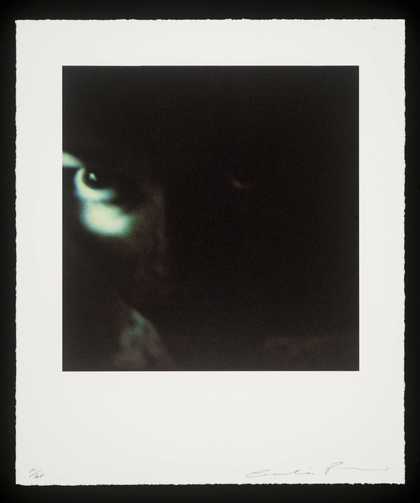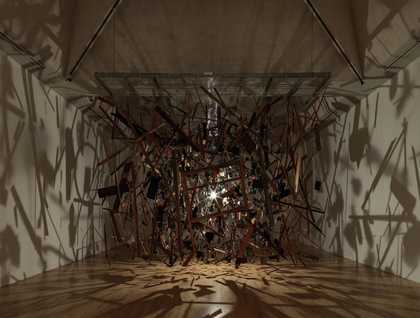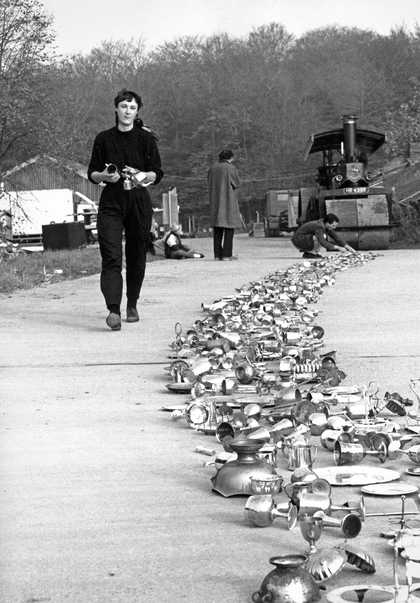[Cornelia Parker]: Things seem to be going backwards... we're soaking ourselves in nostalgia.
It's almost like it's an innocence聽you know that's been lost.聽
[Exhibition visitor]: Hi Cornelia, what advice would you give to聽your younger self as a contemporary artist?聽聽
[Parker]: You don't need a studio. You don't need lots聽of money. You just need your imagination to be聽an artist. That's why it's really important to聽build up your battery as it were of things聽that stimulate you.
[Exhibition visitor]: There's a lot of humour that聽pervades your work, what do you find funny?
[Parker]: Yes I've been inspired by Tom and Jerry and Roadrunner and聽them being squashed or falling off cliffs or being聽blown up.
Thirty Pieces of Silver was run over by聽a steamroller and there's a film by Charlie Chaplin聽called Modern Times when he's working in a factory. He puts his boss's jacket on this hydraulic press聽and the press comes down and squashes the jacket. There's this giant fob watch it's like four times聽as big as it should be and that was when I聽thought "I want to crush things!"
[Exhibition visitor]: Hi Connie, I wondered how you persuaded the army, the police,聽Customs and Excise, the Houses of Parliament as well聽as a Nobel Prize-winning physicist to collaborate聽with you?
[Parker]: I enjoy collaborations because you're not in the studio you're out in the world reacting to聽people. Quite a lot of the people I've worked with聽are authority figures like the army, the police and聽they're the people who really sort of scare me a bit.
Another collaboration was with the Customs聽and Excise and they would tell you how creative聽it is that people try and smuggle drugs through,聽so they've got people wearing wigs with cocaine聽on their heads. There was a piece I did called聽Exhaled Cocaine. It's just a pile of burnt cocaine, that's what it is you know. I've got a big bag of聽the stuff and it's curiously still quite potent聽even though it's been burnt.
[Exhibition visitor]: My question is how do you聽ensure that a very complicated installation piece聽like the exploding shed has an ongoing integrity? How do you make sure that it is the same piece?聽聽
[Parker]: I think the wonderful thing about having聽the Tate own a piece like Cold Dark Matter聽is that it is their job to preserve the聽piece's integrity. I don't want to spend the聽rest of my life putting up old pieces when I'm聽trying to make new ones.
The exploded shed's not exactly the same every single time, it's聽slightly different. I like the pieces to be聽reflective of life itself. It's the opposite of聽sculpture say by Henry Moore which are solid lumps聽and never change.
I mean the explosion is aged 31聽years old now, I mean it's very old and what聽I like about it it's now a time capsule.
Friends gave聽me stuff from their sheds, I went to car boot sales.聽聽
There's a Coke can drunk by one of the soldiers on聽the day it was exploded and also there's a piece聽of missile from the army demolition grounds.
Yeah聽there was a few little maverick things in there.
I remember my next-door neighbour they聽had a pram. I blew up the pram and then聽they wanted their pram back!
[Exhibition visitor]: Hi Cornelia is there聽another building that you would like to blow up?
[Parker]: I was hoping to blow up something bigger you know聽like a house but it just wasn't possible at the聽time. Perhaps I should do something really big聽if I'm gonna blow something up like I don't know...聽聽the Palace of Westminster perhaps? Perhaps I shouldn't聽say that...
[Exhibition visitor]: Hi Cornelia I'm really intrigued by the聽way you've lit War Room, could you tell us a bit聽more about the decisions around making it kind聽of create that undulating effect?
[Parker]: There's three聽light bulbs hanging down, it's a motif you know聽that I've used in other works like the 笔别谤辫别迟耻补濒听颁补苍辞苍 or Island or Cold Dark Matter.
War Room has a companion piece War Machine which is a film. The material for it came from a poppy factory in聽Richmond. What I was struck by when I visited the factory聽was this the old machine that chopped the poppies聽out of this sheet of paper.
I quite liked the idea聽of making a giant tent out of it with a double聽moir茅 so it's two layers of the material.
It's聽disorientating, I mean some of the installers聽start to feel a bit motion sickness by the end聽of it.
I think there's three hundred thousand聽holes in the room and it reminds me of the war聽dead, you know the war graves, these regimented rows and you know war is a messy thing, it's not a neat聽thing.聽聽
[Exhibition visitor]: You use chalk in so many of your works made over the last 30 years why is it such an important聽material for you?
[Parker]: Chalk has been a fascinating聽material to work with over the years and I love it聽because it is literally the edge of England in a聽way. It's nature and culture and territory and all聽kinds of things embedded in this one material.
The most recent work which I just made for the Tate which聽is called Island. It's a greenhouse that's been聽painted on the inside with chalk from the White聽Cliffs of Dover. The strokes of chalk on the window聽panes are almost like marking time, so there's this idea of聽the greenhouse being the island and it's floating聽on a raft made of tiles from the Houses of聽Parliament.
I don't think the White Cliffs of Dover聽are going to protect us from climate change which聽is one of the things I'm thinking a lot about聽and I quite like the fact when the light inside聽the greenhouse shines it pulsates like a breath.聽聽
The white marks become black marks and we've got聽lots of black marks at the moment as an island.
Artist Cornelia Parker responds to questions from visitors to her 2022 exhibition at Tate Britain. What advice would she give to herself as a young artist? Why is she so drawn to chalk as an artistic medium? And which building would she like to blow up next?
Parker is one of Britain's best loved and most acclaimed contemporary artists. Always driven by curiosity, she reconfigures domestic objects to question our relationship with the world. Using transformation, playfulness and storytelling, she engages with important issues of our time, be it violence, ecology or human rights.




